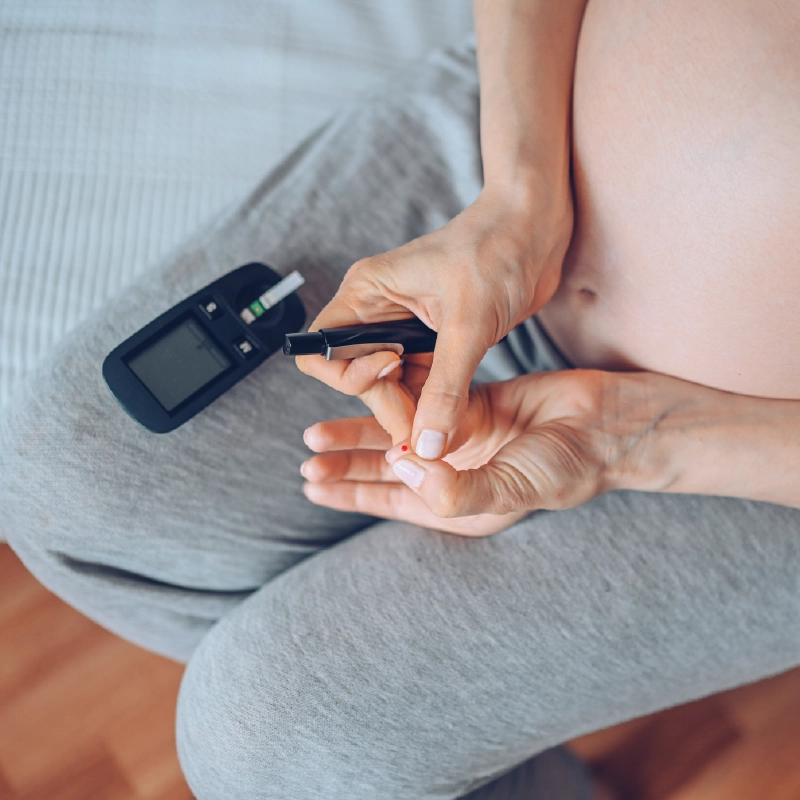
For women, pregnancy is a period of immense happiness and anticipation. However, it can also be a time of increased health risks, especially for women with pre-existing medical conditions like diabetes. Diabetes is a chronic condition that affects the way your body processes blood sugar, and when it occurs during pregnancy, it's called gestational diabetes. You can consult with an endocrinologist in Bangalore to receive a proper diagnosis and determine the best course of treatment. In this article, we will explore the risks associated with diabetes in pregnancy and the management strategies available to ensure a healthy pregnancy for both mother and baby.
What is Gestational Diabetes?
Gestational diabetes is a form of diabetes that occurs during pregnancy. It is characterized by high blood sugar levels that develop in the later stages of pregnancy, and it affects approximately 10% of pregnancies worldwide.
Causes of Gestational Diabetes
The exact cause of gestational diabetes is not fully understood, but it is thought to be related to hormonal changes that occur during pregnancy. During pregnancy, the placenta produces hormones that can cause insulin resistance, which means that the body's cells become less responsive to insulin, resulting in high blood sugar levels. Women who are overweight or obese, have a family history of diabetes, or have previously had gestational diabetes are at higher risk of developing gestational diabetes.
Diagnosis of Gestational Diabetes
All pregnant women should be screened for gestational diabetes between 24 and 28 weeks of pregnancy. The screening test involves drinking a sweet liquid and having blood sugar levels tested one hour later. If the results are abnormal, a follow-up test called a glucose tolerance test may be recommended. This test involves drinking a sweet liquid and having blood sugar levels tested before and after a period of fasting.
The goal of treatment for gestational diabetes is to keep blood sugar levels within a safe range to prevent complications for both the mother and the baby. Treatment may involve making lifestyle changes, such as following a healthy diet and engaging in regular physical activity. In certain cases, medication like insulin may be necessary to control blood sugar levels. Pregnant women with gestational diabetes should also be closely monitored with regular check-ups to ensure that blood sugar levels remain within a safe range.
Risks Associated with Diabetes in Pregnancy
Diabetes in pregnancy can lead to several complications for both the mother and the baby. Uncontrolled blood sugar levels can cause problems with fetal growth and development, making it more likely for the baby to be born with a higher birth weight. This can cause difficulties during delivery and increase the risk of the baby developing obesity and type 2 diabetes later in life.
In addition, uncontrolled blood sugar levels can cause complications for the mother, such as high blood pressure, preeclampsia, and an increased risk of gestational diabetes in future pregnancies. In rare cases, uncontrolled diabetes can lead to serious complications such as preterm labour, stillbirth, and birth defects.
Management Strategies for Diabetes in Pregnancy
The good news is that with proper management, most women with diabetes can have a healthy pregnancy and delivery. Management strategies include:
Monitor blood sugar levels: Pregnant women with diabetes should monitor their blood sugar levels regularly. They may need to check their blood sugar levels multiple times a day, especially after meals. This helps to ensure that blood sugar levels remain within a safe range and can be adjusted accordingly with medication or lifestyle changes.
Maintain a healthy diet: A healthy diet is important for all pregnant women, especially for those with diabetes. Eating a diet rich in whole grains, fruits, vegetables, and lean proteins can help to control blood sugar levels and promote fetal growth and development. Women with diabetes should also limit their intake of sugary and high-carbohydrate foods.
Engage in regular physical activity: Regular exercise is beneficial for both the mother and the baby. It can help to control blood sugar levels, improve overall health, and reduce the risk of gestational diabetes and other complications. Pregnant women with diabetes should consult with their healthcare provider to determine the type and frequency of exercise that is appropriate for them.
Take medication as prescribed: In some cases, medication may be necessary to control blood sugar levels during pregnancy. Insulin is the most common medication used to treat diabetes in pregnancy, and it is safe for both the mother and the baby. Oral medications may be used in certain cases, but they are generally not recommended during pregnancy.
Attend regular check-ups: Women with diabetes during pregnancy should have regular check-ups with their healthcare provider. These appointments are important for monitoring fetal growth and development, managing blood sugar levels, and addressing any concerns or complications that may arise.
Conclusion
In conclusion, gestational diabetes is a common condition that can develop during pregnancy. It is important for pregnant women to be screened for gestational diabetes and to receive appropriate treatment to prevent complications for both the mother and the baby.
Diabetes in pregnancy can be a challenging condition to manage, but with the right strategies and support, most women can have a healthy pregnancy and delivery. The doctors at Sakra World Hospital will help you with the management of diabetes during pregnancy and help in curating a plan that works best for you and your baby. By monitoring blood sugar levels, eating a healthy diet, engaging in regular exercise, taking medication if necessary, and attending regular check-ups, you can help to ensure a healthy pregnancy and delivery for both you and your baby.

